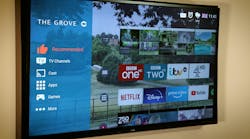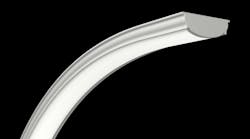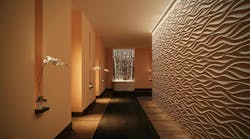MUNICH, Germany--Seoul Semiconductor Co., Ltd. (KOSDAQ 046890), a leading global innovator of LED products and technology, announced the results of a recent study conducted by Dr. Octavio L. Perez, adjunct researcher in Integrative Lighting at Mount Sinai Hospital in NYC, NY, USA on the non-visual melanopic stimulus of LED sources. The study showed that the company’s SunLike Series natural spectrum LEDs provide up to 21% more melanopic stimulus than conventional LEDs at 4000K, and the same melanopic stimulus as daylight at 6500K (D65).
In addition to the visual effects of light and lighting on people, such as visual acuity and color fidelity, there are also non-visual effects. These non-visual effects can affect human health and well-being in aspects related to sleep, awakeness, alertness, circadian rhythmicity, circadian disruption, performance, and mood. Recent building standards, such as the ‘WELL Building Standard,’ assess these non-visual effects of lighting in buildings in terms of the ‘melanopic stimulus,’ not just in terms of conventional photometry and colorimetry.
The recent study evaluated the M-EDI (CIE DIS S026/E:2018 Melanopic Equivalent Daylight Illuminance) of different light sources at different correlated color temperatures (CCT in K). M-EDI is the only metric compliant with the International System of Units (IS) to evaluate the non-visual stimulus of light and lighting, based on the CIE (the International Commission on Illumination) D65 standard daylight illuminant. The preliminary results indicate that the SunLike Series natural spectrum LEDs provide more melanopic stimulus, at any given CCT, than any other LED light source at the same photopic illuminance (in lux) – up to 21% more M-EDI stimulus compared to a conventional 4000K CRI80 LED (4000K being the prevalent CCT in office and school environments).
A typical 4000K CRI80 LED provides 59.30 M-EDI lux for every 100 photopic lux, and a 4000K SunLike LED provides 71.94 M-EDI lux at the same photopic illuminance level. At 6500K, the SunLike LED delivers 99.95% of the M-EDI melanopic stimulus provided by the CIE D65 daylight standard illuminant at the same photopic illuminance. It means that at 6500K, the SunLike Series LEDs provide the same natural melanopic stimulus as daylight (D65).
The reason for this is that the SunLike Series natural spectrum LEDs have a continuous spectral power distribution (SPD) emission that mimics sunlight spectrum at different CCT, in the visual region not including UV and IR. Conventional LED light sources have a peak at 450nm, followed by a valley at the peak of the melanopic efficiency curve, around 480nm. This peak at 450nm for conventional LEDs may also produce non-desired effects on eye health. The melanopic stimulus of the 6500K SunLike LEDs match the shape of the melanopic stimulus provided by D65, avoiding potential blue light peak and ethical issues.
Human centric lighting solutions go beyond the prevalent visual metrics of photometry colorimetry and conventional lighting design. The SunLike Series natural spectrum LEDs offer better visual appearance and color fidelity (CRI95+), and are specifically designed and engineered to provide more benefits and energy for human health and well-being than any other LED in the marketplace. SunLike Series LEDs are the light source of choice for integrative lighting solutions.
Seoul Semiconductor’s SunLike Series natural spectrum LEDs are the world’s first LEDs to produce light that closely matches the spectrum of natural sunlight. It has also achieved the highest level of eye safety certification from the International Commission on Illumination as an RG-1 level light source with no photo-biological risks.
SunLike Series natural spectrum LEDs were co-developed through the combination of Seoul Semiconductor’s optical semiconductor technology and Toshiba Materials’ TRI-R technology, which defines its original concept as “the light closest to the sun for human well-being.” TRI-R technology enables the spectrum of natural sunlight to be reproduced by a white LED light source. TRI-R is a registered trademark of Toshiba Material Co., Ltd.
About Dr. Octavio L. Perez
Dr. Octavio L. Perez is a passionate professional and scholar who contributes to exploring, developing and bringing to the real world the benefits of light and lighting for human wellbeing and wellness, and ultimately health, integrating in this vision the traditional visual and aesthetical principles of lighting, altogether with energy savings and sustainability values. He works internationally as an independent consultant, focused in human centric lighting (HCL), more precisely “affective lighting”. He is also an adjunct researcher at Mount Sinai Hospital in NYC, where he completed his doctoral research with funding from NIH (National Institutes of Health).
About Seoul Semiconductor
Seoul Semiconductor develops and commercializes LEDs for automotive, general illumination, specialty lighting, and backlighting markets. As the second-largest LED manufacturer globally excluding the captive market, Seoul Semiconductor holds more than 14,000 patents, offers a wide range of technologies, and mass produces innovative LED products such as SunLike – delivering the world’s best light quality in a next-generation LED enabling human-centric lighting optimized for circadian rhythms; WICOP – a simpler structured package-free LED which provides market leading color uniformity and cost savings at the fixture level, providing high lumen density and design flexibility; NanoDriver Series – the world’s smallest 24W DC LED drivers; Acrich, the world's first high-voltage AC-driven LED technology developed in 2005, including all AC LED-related technologies from chip to module and circuit fabrication, and nPola, a new LED product based on GaN-substrate technology that achieves more than ten times the output of conventional LEDs. UCD constitutes a high color gamut display which delivers more than 90% NTSC.
Contact:
Seoul Semiconductor Inc.
Jeonghee Kim
Tel: +82-70-4391-8311





